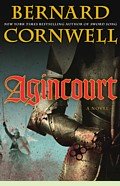|
AgincourtBy Bernard CornwellReviewed by Margaret Donsbach Nicholas Hook is an English shepherd's son, trained to the bow from childhood, embroiled from birth in a vendetta against the family responsible for his grandfather's murder. The constant pitch of suspense in this novel comes partly from the family feud, which follows Hook across the Channel, as well as from his experiences as an archer in Henry V's army. "The first sound was the bowstrings, the snap of five thousand hemp cords being tightened by stressed yew, and that sound was like the devil's harpstrings being plucked. Then there was the arrow sound, the sigh of air over feathers, but multiplied, so that it was like the rushing of a wind.... "For an instant there was silence. "Then the arrows struck. "It was the sound of steel on steel. A clatter, like Satan's hailstorm. "And the day's noise of pain began." Cornwell's research is wide and deep, presenting minute details of medieval life such as the construction and use of the English longbow, as well as authentically recreating the psychology of a time when people felt fewer qualms about killing but also cleaved to a piety we would, today, find both inconsistent to the point of irrationality and simplistic to the point of superstition. Never do these details slow the novel's page-turning pace; rather, they bring readers inside the world of the story and intensify our identification with the characters. Remarkably, Cornwell makes readers thrill to the triumph of the English victory at Agincourt without glorifying warfare itself. The triumph is, in fact, directly proportional to the fear, suffering and degradation of the campaign preceding it, as well as to Hook's enduring struggle to remain alive amid the carnage, not just literally, but emotionally and spiritually. (2008, 451 pages, including a Historical Note separating fact from fiction; titled Azincourt in the U.K., after the French spelling of the battle site) More about Agincourt (including a video trailer and an interview with Cornwell) at Powell's Books Agincourt is on my "Best Historical Novels I Read in 2009" list. Essay by Bernard Cornwell at Powell's Books
The Iliad by Homer (circa 800 B.C.), the magnificent epic poem about the Trojan War. More info Rakóssy by Cecelia Holland (1966), about a sixteenth-century Hungarian baron defending his castle from the Turks. More info Durandal by Harold Lamb (1931), about a Crusader knight who survives a disastrous battle at Antioch. See Review by Annis or More info at Amazon.com
Agincourt by Juliet Barker (2005), especially recommended by Bernard Cornwell. More info Agincourt: A New History by Anne Curry (2000), also recommended by Bernard Cornwell. More info The Face of Battle: A Study of Waterloo, Agincourt and The Somme by John Keegan (1976 and more recent editions), also recommended by Bernard Cornwell. More info
Henry V, Kenneth Branagh's outstanding 1989 film of Shakespeare's play about King Henry V and his victory at Agincourt. See listing at Amazon.com Olivier's Shakespeare, a collection of classic films featuring Sir Laurence Olivier as Hamlet, Henry V and Richard III in adaptations from Shakespeare's plays. See listing at Amazon.com
Wikipedia article on the Battle of Agincourt Back to Directory of Book Reviews
|
